
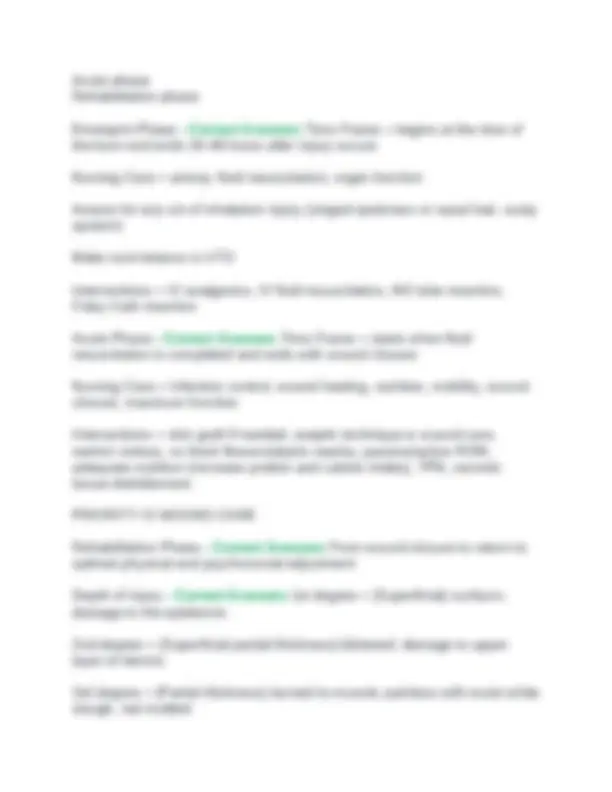
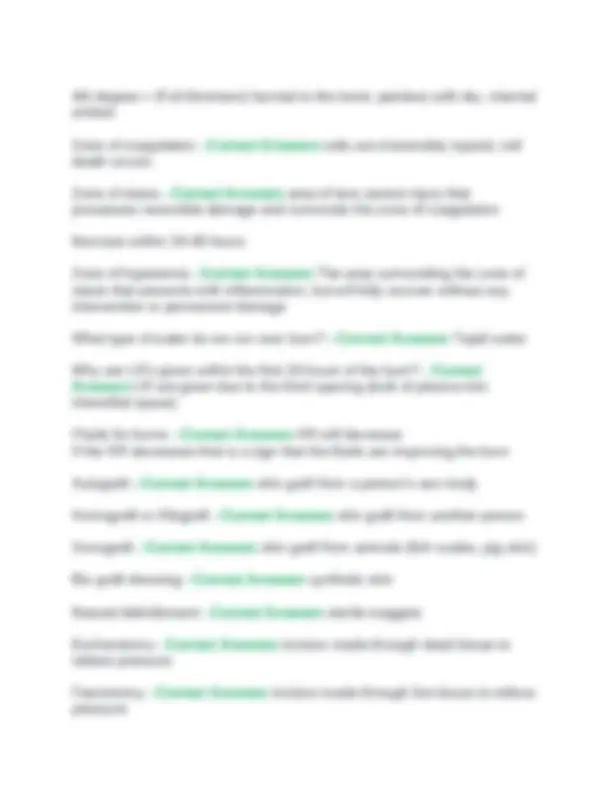
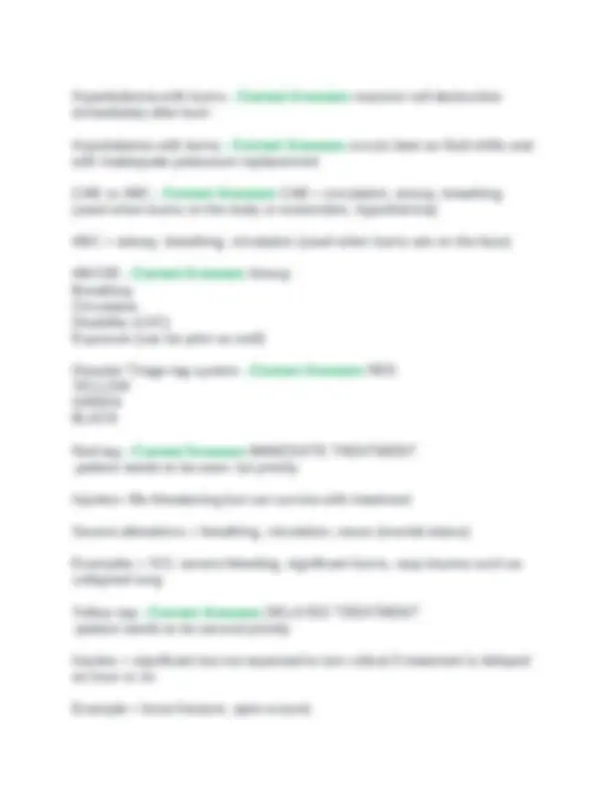
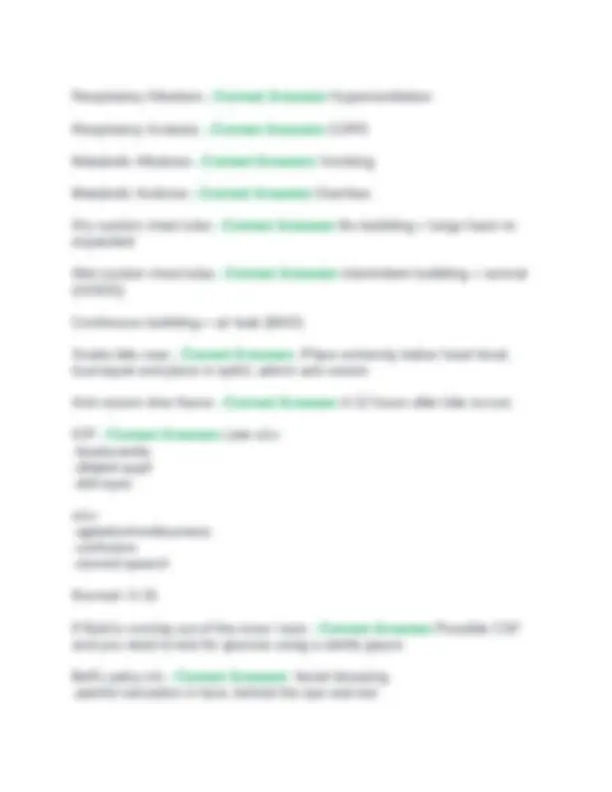
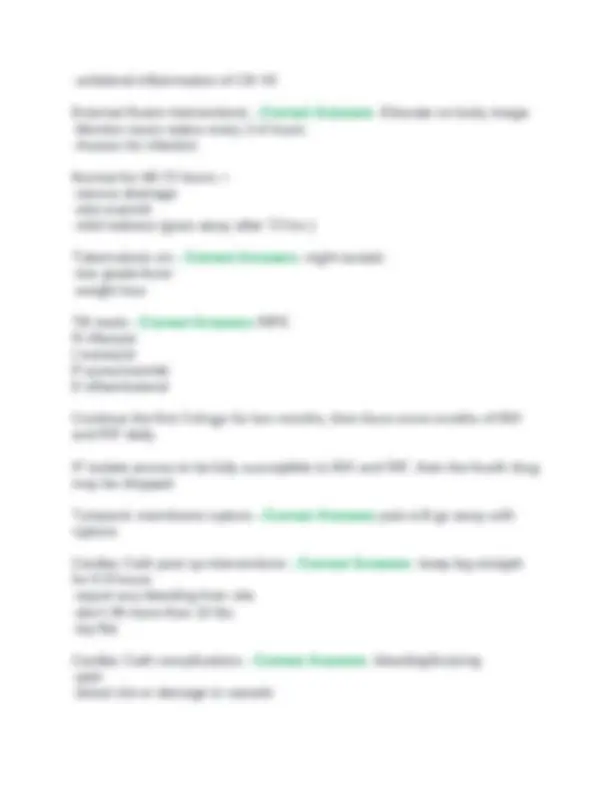
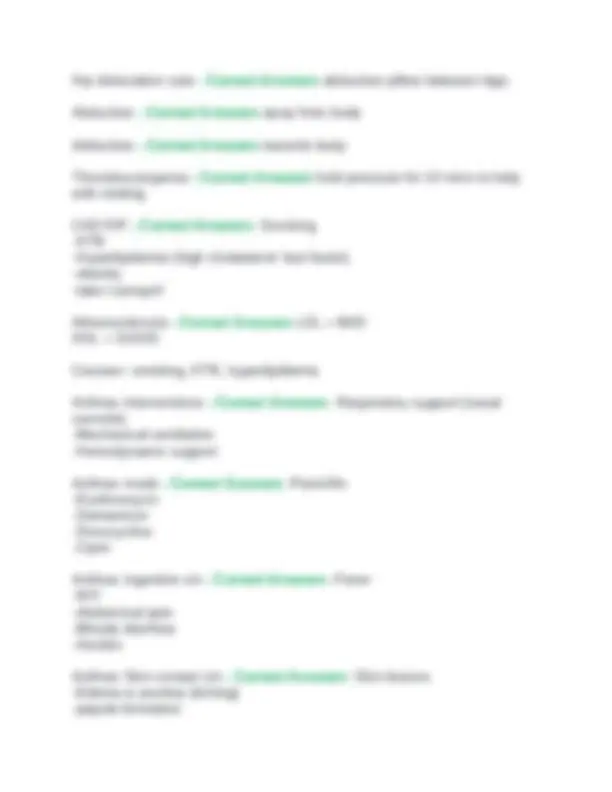


Study with the several resources on Docsity

Earn points by helping other students or get them with a premium plan


Prepare for your exams
Study with the several resources on Docsity

Earn points to download
Earn points by helping other students or get them with a premium plan
Community
Ask the community for help and clear up your study doubts
Discover the best universities in your country according to Docsity users
Free resources
Download our free guides on studying techniques, anxiety management strategies, and thesis advice from Docsity tutors
Advanced Med Surge Final Examination exercise with the best questions and answers
Typology: Exams
1 / 11

This page cannot be seen from the preview
Don't miss anything!







What is shock? - Correct Answers inadequate tissue perfusion Stages of shock - Correct Answers Initial Compensatory Progressive Irreversible Initial shock - Correct Answers to little oxygen to feed organs Compensatory shock - Correct Answers BP normal HR increased S/S: anxious, SOB, confused Progressive shock - Correct Answers cold and clammy is PRIORITY EARLY SIGN BP can no longer compensate clinical hypotension (SBP less than < 90 or decrease of 40 from baseline) Irreversible shock - Correct Answers Death Hypovolemic shock - Correct Answers We will see= oliguria (low urine output)
Priority intervention = Packed RBC Caused by= blood /fluid loss from trauma, burns, Six Neurogenic shock - Correct Answers dysfunction of the sympathetic nervous system Caused by= SCI, trauma Assess for fever and inspect the head and body for sweating All vital signs are LOW (cardiac output low) = neurogenic bladder (lack of bladder control due to ski or nerve problems) Septic shock - Correct Answers endotoxins in the bloodstream from infection such as pneumonia. Positive blood cultures Treatment = antibiotics Cardiogenic shock - Correct Answers heart pump failure (caused by end stage HF, MI) Increased cardiac enzymes Anaphylactic shock - Correct Answers caused by a severe allergic reaction and can lead to airway closure S/S: difficulty breathing, wheezing, angioedema Treatment: Epinephrine / Norepinephrine Shock - Correct Answers Hypotension is a key s/s for all types of shock DIC - Correct Answers clots all over the body leading to ischemia and risk for bleeding 3 phases of burns - Correct Answers Emergent phase
4th degree = (Full thickness) burned to the bone; painless with dry, charred whitish Zone of coagulation - Correct Answers cells are irreversibly injured, cell death occurs Zone of stasis - Correct Answers area of less severe injury that possesses reversible damage and surrounds the zone of coagulation Necrosis within 24-48 hours Zone of hyperemia - Correct Answers The area surrounding the zone of stasis that presents with inflammation, but will fully recover without any intervention or permanent damage What type of water do we run over burn? - Correct Answers Tepid water Why are LR's given within the first 24 hours of the burn? - Correct Answers LR are given due to the third spacing (look of plasma into interstitial space) Fluids for burns - Correct Answers HR will decrease If the HR decreases that is a sign that the fluids are improving the burn Autograft - Correct Answers skin graft from a person's own body Homograft or Allograft - Correct Answers skin graft from another person Xenograft - Correct Answers skin graft from animals (fish scales, pig skin) Bio graft dressing - Correct Answers synthetic skin Natural debridement - Correct Answers sterile maggots Escharotomy - Correct Answers incision made through dead tissue to relieve pressure Fasciotomy - Correct Answers incision made through live tissue to relieve pressure
Hyperkalemia with burns - Correct Answers massive cell destruction immediately after burn Hypokalemia with burns - Correct Answers occurs later as fluid shifts and with inadequate potassium replacement CAB vs ABC - Correct Answers CAB = circulation, airway, breathing (used when burns on the body or extremities, hypothermia) ABC = airway, breathing, circulation (used when burns are on the face) ABCDE - Correct Answers Airway Breathing Circulation Disability (LOC) Exposure (can be prior as well) Disaster Triage tag system - Correct Answers RED YELLOW GREEN BLACK Red tag - Correct Answers IMMEDIATE TREATMENT -patient needs to be seen 1st priority Injuries= life-threatening but can survive with treatment Severe alterations = breathing, circulation, neuro (mental status) Examples = SCI, severe bleeding, significant burns, rasp trauma such as collapsed lung Yellow tag - Correct Answers DELAYED TREATMENT -patient needs to be second priority Injuries = significant but not expected to turn critical if treatment is delayed an hour or so Example = bone fracture, open wound,
Potassium rich foods - Correct Answers Pecans, spinach, asparagus, avocado Calcium rich food - Correct Answers Salmon Hypocalcemia s/s - Correct Answers numbness and tingling in fingers and toes, positive chvostek & trousseau sign Spinal cord injury - Correct Answers Tetra- all 4 extremities (C1-C8) Para- lower extremities (T1-S5) T12 and above = affects respiratory function Spinal cord injury s/s - Correct Answers -absent bowel sounds -absent gag reflex -hypotension How to move patient with SCI? - Correct Answers log roll patient Cardiac biomarkers - Correct Answers -Troponin I and T -Myoglobin -CPK -CK-MB PR interval - Correct Answers 0.12-0. P wave - Correct Answers Atrial depolarization QRS - Correct Answers Ventricular depolarization and atrial repolarization T wave - Correct Answers Ventricular repolarization Kayexalate - Correct Answers AKA = sodium polystyrene Give for hyperkalemia -decreases amplitude of T wave What med helps with breathing - Correct Answers Albuterol nebulizer
Respiratory Alkalosis - Correct Answers Hyperventilation Respiratory Acidosis - Correct Answers COPD Metabolic Alkalosis - Correct Answers Vomiting Metabolic Acidosis - Correct Answers Diarrhea Dry suction chest tube - Correct Answers No bubbling = lungs have re- expanded Wet suction chest tube - Correct Answers intermittent bubbling = normal (GOOD) Continuous bubbling = air leak (BAD) Snake bite care - Correct Answers -Place extremity below heart level, tourniquet and place in splint; admin anti-venom Anti-venom time frame - Correct Answers 4-12 hours after bite occurs ICP - Correct Answers Late s/s= -bradycardia -dilated pupil -doll eyes s/s= -agitation/restlessness -confusion -slurred speech Normal= 0- If fluid is coming out of the nose / ears - Correct Answers Possible CSF and you need to test for glucose using a sterile gauze Bell's palsy s/s - Correct Answers -facial drooping -painful sensation in face, behind the eye and ear
Hip dislocation care - Correct Answers abduction pillow between legs Abduction - Correct Answers away from body Adduction - Correct Answers towards body Thrombocytopenia - Correct Answers hold pressure for 10 mins to help with clotting CAD R/F - Correct Answers -Smoking -HTN -Hyperlipidemia (high cholesterol: fast foods) -obesity -take Lisinopril Atherosclerosis - Correct Answers LDL = BAD HDL = GOOD Causes= smoking, HTN, hyperlipidemia Anthrax interventions - Correct Answers -Respiratory support (nasal cannula) -Mechanical ventilation -Hemodynamic support Anthrax meds - Correct Answers -Penicillin -Erythromycin -Gentamicin -Doxycycline -Cipro Anthrax ingestion s/s - Correct Answers -Fever -N/V -Abdominal pain -Bloody diarrhea -Ascites Anthrax Skin contact s/s - Correct Answers -Skin lesions -Edema w pruritus (itching) -papule formation
-development of painless eschar Anthrax Inhalation s/s - Correct Answers -Flu symptoms -fever -cough -vomiting -weakness -mild chest discomfort Rule of 9's - Correct Answers